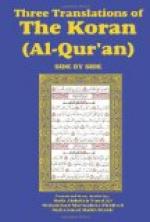Say: this is a weighty message,19
From which ye turn aside!
Yet had I no knowledge of what passed among the celestial chiefs when they disputed,20
-Verily, it hath been revealed to me only because I am a public preacher-
When thy Lord said to the angels, “I am about to make man of clay,21
And when I have formed him and breathed my spirit into him, then worshipping fall down before him.”
And the angels prostrated themselves, all of them with one accord,
Save Eblis. He swelled with pride, and became an unbeliever.
“O Eblis,” said God, “what hindereth thee from prostrating thyself before him whom my hands have made?
Is it that thou are puffed up with pride? or art thou a being of lofty merit?”
He said: “I am more excellent than he; me hast thou created of fire:22 of clay hast thou created him.”
He said: “Begone then hence: thou art accursed,23
And lo! my ban shall be on thee till the day of the reckoning.”
He said: “O my Lord! respite me till the day of Resurrection.”
He said, “One then of the respited shalt thou be,
Till the day of the time appointed.”
He said: “I swear by thy might then that all of them will I seduce,
Save thy sincere servants among them.”
He said: “It is truth, and the truth I
speak. From thee will I surely fill
Hell, and with such of them as shall follow thee,
one and all.
Say: I ask no wage of you for this, nor am I one who intermeddleth.
Of a truth the Koran is no other than a warning to all creatures.
And after a time shall ye surely know its message.
_______________________
1 The letter S. See Sura lxviii. p. 32.
2 These verses are said to have been revealed when, upon the conversion of Omar, the Koreisch went in a body to Abu Talib and requested him to withdraw his protection from Muhammad, but being put to silence by the latter, departed in great confusion. Wah. Beidh.
3 That is, in the Christian religion, which teaches, Muhammad ironically implies, a plurality of Gods.
4 This may allude to the so-called “confederacy” of the Koreisch against Muhammad.
5 This term is also applied to Pharaoh, Sura lxxxix. 9, p. 54. He is said to have fastened the Israelites to stakes, and then subjected them to various torments.
addenda: This is the usual interpretation. Lit. Lord of, or, possessor of stakes (comp. li. 39 in Ar.), i.e., Forces. Dr. Sprenger ingenuously suggests that Muhammads Jewish informant may have described Pharaoh as rich in neçyb, i.e., fortresses; whereas, in Ar., naçyb, means an erection, pillar, etc., for which Muhammad substituted the word for tent stakes. Vol. i. (470).
6 Præditi (manibus) virtute. Mar.
7 Comp. Ps. cxlviii. 9, 10.




